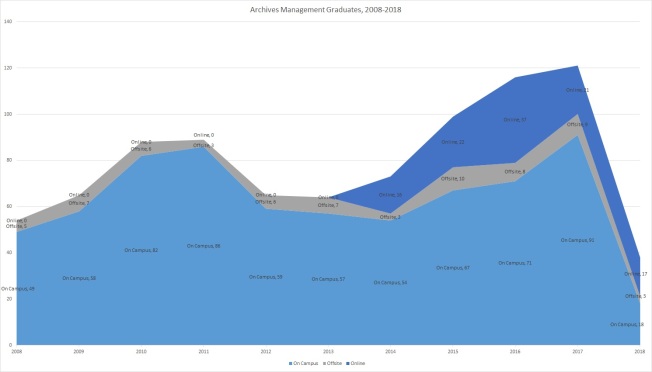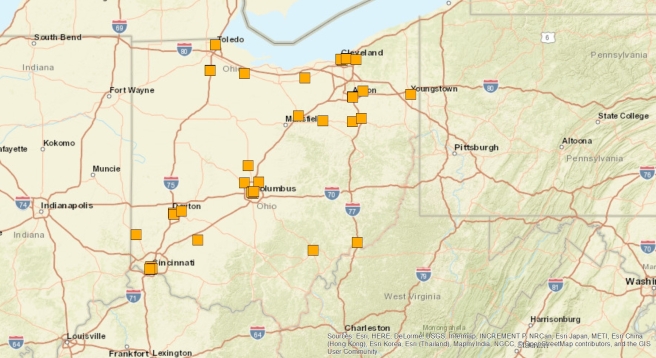Question 1: The public policy program, which you propose in your report, outlines three foundational principles for a Green New Deal for Archives (increasing permanent staffing for archives “that steward vital public records”, “create a nationwide plan for collection continuity and emergency response,” and developing “climate change documentation projects organized by watersheds”). Do you envision this program as applying to community archives or activist archives, in the United States, which are not formal institutions?
Eira Tansey: In a Green New Deal for Archives policy platform I think there’s an important role for community archives to play in documenting watersheds and local environmental problems. Community and activist archives can do this in ways that government archives likely could not or would not. Even in the original Historical Records Survey which I explore in the publication, WPA workers did important work to identify archives from informal institutions. I think that work can and should be replicated in a Green New Deal for Archives.
With that said, there is a reason why I put the first priority as increasing staffing at archives that steward vital public records, because I think this is the most important priority facing American archives. To be clear, vital records have a specific definition: “a record necessary to begin recovery of business after a disaster, as well as a record necessary to protect the assets, obligations, and resources of an organization” and “a record that documents significant life events, including births, deaths, marriages, and divorces.”
Vital records are usually stewarded by public-facing archives like local, state, and federal government archives. Without the preservation and access of vital public records, we are at major risk of losing individual rights and the collective ability to hold public institutions accountable. Like the original New Deal that emphasized the importance of strengthening government institutions as a means to better serve the public (instead of primarily relying on the private sector), I believe we need to apply similar thinking to meet the scale of climate change adaptation in archives.
My stance on this is shaped by my professional trajectory, which comes from working in academic libraries for 15 years until I left earlier this year to build my business. In my last role I was the records manager for one of the largest public universities in the state of Ohio for nearly a decade. Records management work, even in higher education, has far more in common with the kind of archives work carried out by government archivists than a topical focused curatorial collecting model. Even though my institution was legally mandated by Ohio law to carry out records management, and retention scheduling directly supported our most popular use area – university archives – I received zero dedicated budget resources for records management. Meanwhile collections of non-institutional materials that had comparatively little use had endowed funds. This led me to appreciate how the records that receive the most use and are required to be managed according to law rarely receive the resources needed to do this work effectively, and are especially vulnerable to becoming unfunded mandates.
In my city of Cincinnati, we do not have a municipal archive that makes the records of the city easily available to the public. So based on my own local experience, I’m not convinced that formal institutional archives are always receiving the support they need to make the records of government and public institutions accessible and accountable to local residents. In many cases, they don’t exist to begin with.
Librarians – regardless of where they work – understand that public libraries are integral to the larger enterprise of librarianship and that public libraries are an essential part of the democratic experiment. I’d like to see archivists – regardless of where they work – embrace the same kind of support for government and other archives that serve the larger public. This is why although I hope A Green New Deal for Archives will resonate with all archivists, I assert that the priority needs to be on bolstering the capacity of archives that have a broad public mandate.
Question 2: In your view, how should readers, who agree with your “Green New Deal for Archives” public policy proposal, share their support?
Eira Tansey: Learning how to advocate on behalf of archives to elected officials is really important. Within SAA, the Committee on Public Policy has done great work on this front, especially with the Archives on the Hill event that happens when SAA meets in Washington DC.
I have been excited to have some encouraging recent conversations with Congressional staffers about the importance of archives. There are a lot of folks in Congress who care both about climate change and archives, but they don’t necessarily connect the dots between how archives can both identify climate risks and help communities be more resilient in the face of climate disaster. It’s up to archivists to have these conversations and put this issue squarely in front of our elected officials.
Question 3: If you could make a change (or changes) to the core values statement (which states that archivists “must necessarily involve an ongoing awareness of the impact of archival work on the environment”) or recent strategic plan of the Society of American Archivists, based on what you have written in your report, what would you change?
Eira Tansey: SAA’s Core Values statement includes Sustainability, and that section is very thoughtfully worded. However, the current Strategic Plan does not specifically address or name environmental concerns or climate change among its activities. I’d like to see this change in future iterations. For example, many of the strategic plan actions rightfully focus on workforce issues. There is a climate change link here – as increasingly severe and frequent disasters disproportionately impact more vulnerable communities, how will this impact hiring and retention of archivists? Climate change is already affecting our work, and will only continue to do so. Our strategic plan should reflect those realities so we can prepare and respond accordingly.





 Steering Shares are an opportunity to find out more about the I&A Steering Committee. This post is from I&A Steering Committee Member Daria Labinsky. She is an archivist at the National Archives in St. Louis, who works primarily with 20th century military personal data records.
Steering Shares are an opportunity to find out more about the I&A Steering Committee. This post is from I&A Steering Committee Member Daria Labinsky. She is an archivist at the National Archives in St. Louis, who works primarily with 20th century military personal data records. Steering Shares are an opportunity to find out more about the I&A Steering Committee. This post is from Steering Committee member Stephanie Bennett.
Steering Shares are an opportunity to find out more about the I&A Steering Committee. This post is from Steering Committee member Stephanie Bennett.